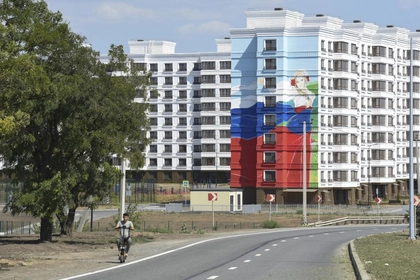War is well known to radically shift the dynamics within society, often leading to a marked tilt towards collectivism after the period of conflict has subsided. Both the political structures of societies and the commanding heights of economic productivity become centrally managed.
Many of these changes can be traced to the economic and political remoulding at the national scale that was necessary during war, and the view of those who return from the front. On emergence from war, there is a temptation, given the perceived success of this arrangement, to continue it long into peacetime.
JOIN US ON TELEGRAM
Follow our coverage of the war on the @Kyivpost_official.
But as political scientist Michael Oakeshott observed about the end of the Second World War: ‘Even if the much advertised economies of gigantic financial combinations were real, sound policy would wisely sacrifice these economies to preservation of more economic freedom and equality.’
After the Second World War, there was a widely held sense in the Allied powers that the centralised economies of the war should be continued, given their proven effectiveness. There is little doubt that this cultural shift wrought some stunning improvements; in Britain it included the birth of the National Health Service (NHS), but it also encouraged in society a fundamentally statist view of economics, which in the long term was not beneficial. The US, probably because of its political history, reverted to a market economy rather quickly, yet even there the role of the state in national management had been irreversibly increased.

Moscow Imposes Russian Car Insurance in Occupied Ukraine by 2025
How might Ukraine maximise its effective recovery and development in a post-war order in the light of this history?
As a scientist, I find the scientific and technological potential of special interest. At least one realm in which Ukraine can direct wartime energies is to expanding existing scientific institutions and creating fresh ones that offer opportunities to a new generation of scientists and technologists in the country.
I don’t think that war should be the underlying motive for building good scientific institutions, or at least I think that we should have a desire to build scientific capacities which encompass more than the exigencies of war. However, in a very direct way, Ukraine has experienced the role of science and technology in the defence of its existence and this has alerted a generation of younger Ukrainians to the value of scientific and technical enterprise.
Efforts need to be made, and supported by international organizations, to grow and buttress Ukraine’s universities, colleges, and institutes. A strong scientific and technical foundation can go a long way to attracting investment into the country and in its turn, providing the feedstock for new companies, much in the same way that Ukraine’s early mathematics and computing expertise drove its present capabilities in the IT sector.
One promising area is space exploration. Ukraine has an impressive nascent space sector. Already, the Kyiv Polytechnic Institute launched a technology demonstration satellite into orbit in January this year with the launch company SpaceX, a stunning accomplishment. Last year, in the midst of war, two companies, Maritime Launch and Nanoracks, signed an agreement with the State Space Agency of Ukraine to develop a program to design and build small satellites (so-called ‘cubesats’) for Ukrainian universities.
With growing international scientific activity in space exploration, from Earth-observing satellites to planetary missions, and the expanding economic potential associated with it, this represents an especially promising direction. In its turn, this effort can fortify the conditions for private enterprise and more widely, innovation in Ukraine’s universities and technical institutes.
More ambitious objectives can be imagined. Ukraine should be tracked towards full membership in the European Space Agency (ESA) with the scientific and industrial opportunities that would entail. For its part, Ukraine could establish new institutes and university centres focused on developing instruments and technology to fly on planetary missions with space agencies around the world. From the search for life to geophysical studies of distant planets and moons, eventually these efforts would lead to Ukraine-led missions, building on the demonstrated ability to show this leadership with cubesat missions. As the exploration of space is an inherently international endeavour, this field of activity can be a fillip to Ukraine’s broader interests in expanding international collaboration.
Of course, this is easier said than done, because it is not merely a mental shift that has been caused by war, it is the practical realities of scientific organization, supply chains and the commandeering of personnel and budgets, all of which have been directed to the war effort. To return to a free economy in which these potentialities can be fully realized requires not merely a reduction of state control as a matter of principle, but financial and technical efforts to disentangle all of these new relationships. That may seem unwanted in a time that is already economically stressed – it is less costly to continue with what has been established. However, in the long term, Oakeshott’s point is that the short term cost of this dismantling and restructuring is largely worth it because of the free environment it will ultimately encourage.
Ukraine will need to find a happy balance which mobilizes the newfound social spirit to build national institutions, including scientific organizations, but at the larger scale, to transition the country back out of a war economy to a civilian economy in which the democratic values of civil society can find their full expression. Healthy scientific, economic, cultural and political links with other countries of the world, including the EU, will greatly aid in this success since connection to liberal democratic nations will encourage, as a matter of course, the protection of these social structures within Ukraine.
The second major source of potential conflict after war emerges from the population itself, not so much the national structures of politics and economics. Upon returning from the front or playing a full role in defence throughout the country, many people will rightly feel that a payment is due. In Britain after the Second World War, there was a widespread expectation of a better society in return for the sacrifices made. A national health service was one way to deliver on those demands.
Equally, a society cannot transform itself into a utopia overnight. After the Second World War, a sense of ennui persisted in the austerity and continued rationing that occurred after hostilities had ended. The recognition that there will be struggles in the civilian realm after the war, and the likelihood of a sense of disappointment that hard sacrifices cannot be immediately cashed in for a better life, are always prominent.
Yet, at the same time, a population that has struggled together for its liberty is immensely powerful. On this score, Oakeshott observed that: ‘If there are vital, creative forces to be released by demobilization – by return to a free society – the nation may thereby gain enough strength to compensate handsomely for the risks involved’. Demobilization offered the opportunity for the emergence of a revitalized and effectively competitive economy because those returning from the front were keen to get stuck in and build a better life for themselves and their children.
In essence, although war is tiring, it stirs energetic creative resources, since, to put it in a rather crude way, it reminds people that life is short and worth making something of. It is a little like an individual who experiences a serious illness and comes out of it with a second wind, a more acute sense of mortality that drives them to make good on every valued and special day.
On a national level, our daily assumption of peace and tranquillity in our lives is shattered by war. From it can come influential forces for good, a national awakening or enthusiasm to make the most of everything and strive for the highest. That is not to give war a positive spin; there is no silver lining in its death and destruction. However, the point of fact is that when it does occur, it has the potential to give rise to an impetus that can at least be channelled to productive ends.
In essence, Ukraine must succeed in the eternal struggle between liberty and authority and tilt its society back towards the former after war has unkindly and deliberately dragged it to the latter. Science and technology, the exploration of space just being one example, can have a role to play in nurturing the institutional environment of a successful free civil society.
Charles Cockell is Professor of Astrobiology at the University of Edinburgh.
You can also highlight the text and press Ctrl + Enter






